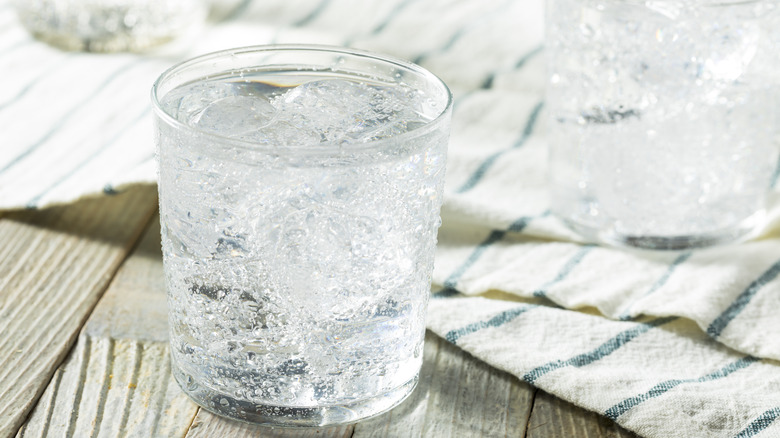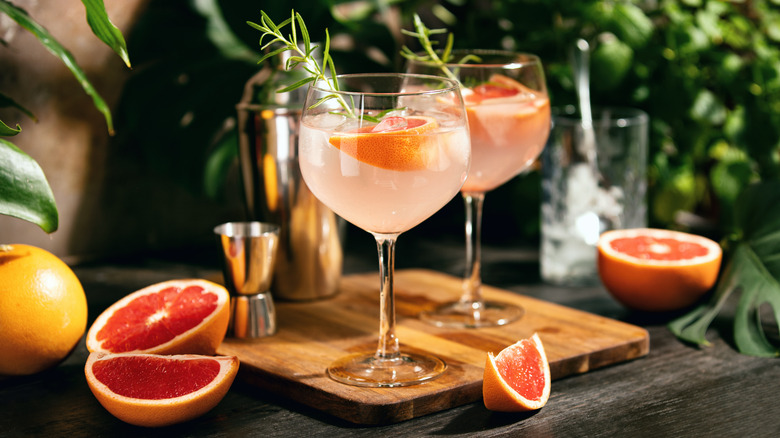When Should You Pick Up Tonic Water Vs. Club Soda For Your Drink?
The world of alcoholic drinks is a vast one, and the options sometimes seem endless. The varieties of spirits vary just as much as the mixers, but two of the most common bubbly additions to a drink are the tried-and-true carbonated cousins of club soda and tonic water. According to Mixology, tonic water has its origins in 1820 when people used it primarily as a medicine while the first iterations of club soda come in 1877 when it was also used as a health remedy (via Culinary Lore). This must mean cocktails are healthy, right?
For those who are unfamiliar with mixed beverages, you might guess that club soda and tonic water are interchangeable. Per Healthline, they're both just different types of sparkling water. However, the two vary very distinctly in a number of other categories, from calorie content to taste. According to Healthline, the main difference between the two really lies in only one small addition. So what exactly does that mean for your beverage? Well, a vodka tonic and a vodka soda certainly don't taste the same, so it's good to know what's really different about these mixers. It's time we talk about when you should pick up club soda vs. tonic water.
The real difference between tonic water and club soda
Before we jump into how you can use each of these carbonated beverages in a drink, let's discuss how exactly they both differ. First, consider club soda. Per Healthline, this drink is simply water that has been infused with CO2 bubbles. Afterward, minerals like potassium sulfate and sodium bicarbonate are added for taste. Per Soda Stream, the exact mineral additions vary by manufacturer, but most say that the additions add a salty taste to the drink. While club soda is commonly used in cocktails like a classic Tom Collins, it has many other practical uses as well per Reader's Digest.
According to Healthline, tonic water is the same as club soda, but with one pivotal step added. It's infused with quinine. Quinine is a bitter-tasting compound taken from the bark of a tree, which gives tonic water its distinct taste. According to Masterclass, manufacturers add sugar to tonic water to offset the drink's strong taste, so make sure to read the label if you want your drink sugar-free. While tonic water used to contain higher amounts of quinine when it was used to prevent malaria in the tropics, it is now almost exclusively used as a mixer (via Healthline).
So, should you use club soda or tonic water?
Bubbly mixers like club soda and tonic water bring life to otherwise flat drinks, and some beverages just beg for a little bit of that carbonation. Based on what taste you're looking for, let's talk about which carbonated water you should be using as your mixer.
To start, note that tonic water has strong bitter and citrusy notes. Because of this, it makes a good pairing with "botanical spirits" like gin, or other citrus-forward alcohol and drinks. Tonic water is also a good addition to sweeter cocktails since its natural bitterness can add depth to sugar-forward flavors. While tonic water is a great standout addition to drinks, club soda offers a more mild taste. This is what makes club soda a great addition to a beverage if you're seeking the simple presence of carbonation. If your mixed drink is already teeming with flavor, like in a vivid hibiscus mojito, look to club soda for nothing but that fizz.
If you are going the club soda route, make sure to stick with a brand that offers minimal mineral additions to avoid overly-salty flavors. There are a few brands that make club soda specifically for use in drinks, so be sure to grab one of those. So now only one question remains: Are you team club soda or tonic water?


